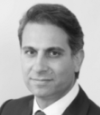David Southern QC
 David Southern QC welcomed me warmly to his rooms in Temple Tax Chambers, Middle Temple, with their stunning views over Embankment Gardens towards the South Bank and Middle Temple Gardens. After making me a coffee, David suggested with wry good humour that he must be one of the “more mature” Silks appointed by HM The Queen in 2014. Be that as it may, called to the Bar in 1982, David was now one of the UK’s most in-demand tax lawyers, as well as an eminent tax academic – he was Visiting Professor and Director of School of tax law, Queen Mary, University of London. He regularly appears in a great range of tax tribunals and courts (up to and including the ECJ) and numbers amongst his clients leading global corporations, prominent individuals and political parties.
David Southern QC welcomed me warmly to his rooms in Temple Tax Chambers, Middle Temple, with their stunning views over Embankment Gardens towards the South Bank and Middle Temple Gardens. After making me a coffee, David suggested with wry good humour that he must be one of the “more mature” Silks appointed by HM The Queen in 2014. Be that as it may, called to the Bar in 1982, David was now one of the UK’s most in-demand tax lawyers, as well as an eminent tax academic – he was Visiting Professor and Director of School of tax law, Queen Mary, University of London. He regularly appears in a great range of tax tribunals and courts (up to and including the ECJ) and numbers amongst his clients leading global corporations, prominent individuals and political parties.
David explained that, having begun his career gaining a thorough grounding in the nuts and bolts of tax through working for the Inland Revenue and later for Lloyds Bank, he transferred to the Revenue Bar in 1997. From there he steadily built up his practice – and enviable reputation. In talking about preparing for Silk, David highlighted his experience between 2004 and 2007 as Treasurer of the Bar Council, a role that obviously gave him a huge amount of personal and professional satisfaction. David highlights how the role gave him with a “whole new perspective on the world and its people at the Bar”, beyond the somewhat rarefied world of Tax Law.
David acknowledges that gaining the wider view can be hard for an extremely busy senior junior and for some specialists. However, he was strongly of the view that for anyone seriously contemplating applying for Silk, they need to devote some time to gain an appreciation of the Bar at large, in all its diversity. Such experience might also help applicants for QC achieve a much better ‘feel’ for what diversity was all about, one of the QC competition competencies. Working with colleagues across the profession and from diverse backgrounds enabled him to acquire an even deeper understanding of diversity. He says that you have to do more than understand diversity – you had to get involved and be pro-active. And if you were at all cynical about the subject, then perhaps the time was not yet right for your application for Silk, David said.
The particular breakthrough came for David when he was invited to represent the tax payer in the House of Lords, in the case of Fleming (t/a Bodycraft) v R & C Comr. The case has already generated repayments of over £13 billion; in 2008, the Financial Times described it as the ‘VAT case of the decade’. This was a once in a lifetime case. Since then David had maintained a substantial caseload. The application has to be based on cases heard in the two years prior to the application. He was able to base his application on a substantial portfolio of cases within this timeframe.
Those contemplating the demanding process of applying for Silk, he suggests, should be absolutely sure that they are ready. You need to be objective about yourself and your practice, he said, and ask yourself “will I be able to demonstrate to the Selection Panel that I meet all the competencies at a level of excellence?” David began to put his own application together two or three months before applying but had given it considerable thought before then. It was vital, he said, that your twelve cases, your assessors (and hopefully assessments) and self-assessment “all supported one another” to build up your case to convince the Selection Panel. He suggested that applicants should be realistic as to which judicial referees were likely to support the application. David said he showed the completed application form to a close colleague in chambers, who said it read very well. The Selection Panel obviously agreed.
David said he found the selection process to be a thorough and fair one, adding that “the old ways of doing these things” had long passed. The system was now rigorous, objective as it could be, and evidence-based around the competencies. He said he enjoyed the challenge of having to summarise his twelve top cases in just 400 words; the ability to complete the application form to a high level was part of the evidence before the Panel in terms of one’s ability to advocate, albeit for oneself. He had had many interviews throughout his career, and David said that he found the Panel interview one of the “most pleasant, relaxed and, straightforward” ones he had had experienced.
Finally, how did David maintain a healthy life-work balance? He admitted that he could find that a struggle – but only because he ‘thoroughly enjoys every minute’ of the work. However, he said that he made sure that took himself and his wife away each year for a fortnight at Butlin’s at Bognor! More seriously, he acknowledged that due to the compelling nature of the work, the pressures on a busy junior senior preparing for the step up to Silk could be stressful. It was therefore important not to squeeze that final extra last bit of work into the day, tipping the balance in an unhealthy direction.
© Queen’s Counsel Appointments Ltd
- Date: March 25, 2019
- Category: QCA Profiles 2014

